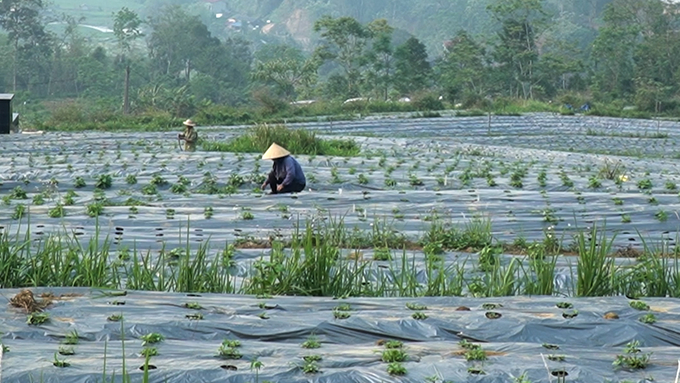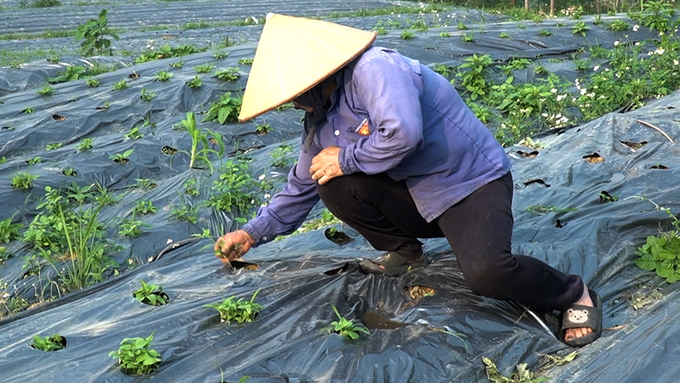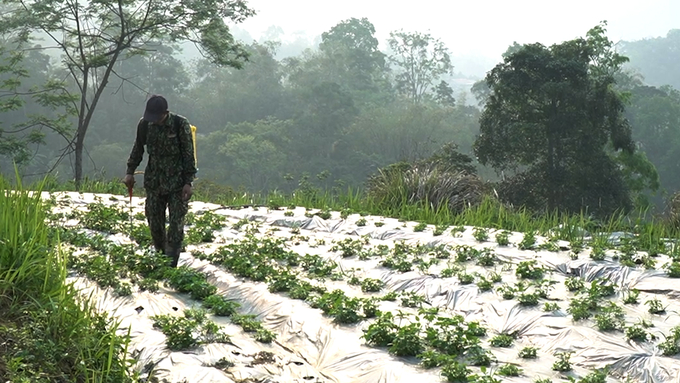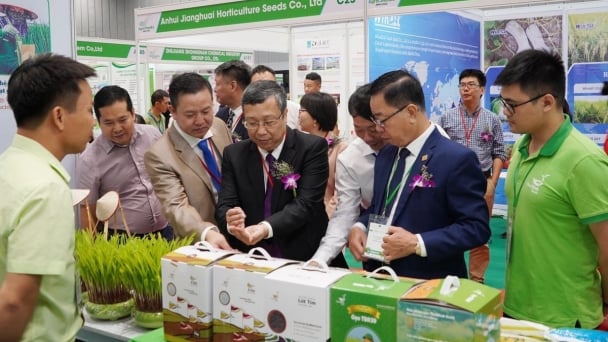June 26, 2025 | 19:46 GMT +7
June 26, 2025 | 19:46 GMT +7
Hotline: 0913.378.918
June 26, 2025 | 19:46 GMT +7
Hotline: 0913.378.918
Bac Kan is a mountainous province located in the centre of the Northeastern region, with nearly 38,000 ha of land for annual crops and more than 333,000 ha of forest and forestry land. In addition to key crops such as oranges, seedless persimmons, Canna, and rice,... the province also has the potential to develop medicinal herbs.
Statistics show that the entire province has 1,000 species of medicinal plants, belonging to 190 different families, including many valuable species growing under the canopy of natural forests.

The region cultivating Ardisia silvestris under the forest canopy brings high income for the residents of Dong Phuc commune (Ba Be district). Photo: Ngoc Tu.
Notably, among these, 52 species have been listed in the Vietnam Red Book, with some species holding high conservation value and great economic potential, such as mulberry, Nanhaia speciosa, Codonopsis, Wisteriopsis reticulata...
If this medicinal resource is protected and exploited properly, it will bring significant economic benefits to the people, contributing to the local socio-economic development. Currently, the market demand for medicinal products is very high, making the conservation and development of medicinal plants a focus for local authorities, who are actively attracting investment.
Accordingly, Bac Kan has implemented several policies, notably Resolution No. 10-NQTU dated April 22, 2021, on developing agriculture and forestry towards concentrated commodity production, expanding value-chain production linkages; Decision No. 2362/QD-UBND dated December 25, 2020, by the Provincial People's Committee on approving the master plan for the development of medicinal plants in Bac Kan province; and Resolution No. 01/2022/NQ-HDND dated April 27, 2022, by the Provincial People's Council, which stipulates support levels for organizations and individuals participating in the production, processing, and business of medicinal plants.
In 2020, the province issued a master plan for the development of medicinal plants for the 2021-2025 period. The objective is to develop medicinal plants by leveraging regional advantages, following the value chain, and identifying medicinal plant development based on the zoning of cultivation areas, applying science and technology in the value chain to meet domestic and export demand, turning medicinal products into important commodities for the province, and participating in national key industries.
According to the plan, the province will develop four concentrated medicinal plant cultivation regions: the Central sub-region; the Eastern sub-region; the Western sub-region; and the Northern and Northeastern sub-regions, with 26 medicinal species and a target area of 545 ha by 2025.
Van Lang Cooperative in the Na Ri district is a pioneer in cultivating and processing medicinal plants. This cooperative has invested in growing olanum procumbens, Celastrus hindsii, and Nanhaia speciosa, covering an area of about 12 ha.
A representative of this cooperative stated that the natural conditions in Van Lang commune are suitable for many types of medicinal plants. To achieve success, the cooperative encouraged local people to participate. Initially, residents were hesitant, but after trying and seeing positive results, they continued to develop, leading to an increasing cultivation area.
In addition to cultivation, the cooperative also supports the people in the Na Ri district with seedlings, guides them in planting and caring for medicinal plants, and purchases the crops for processing when harvested.
In Bac Kan city, Tan Thanh Agricultural Cooperative (in Nong Thuong commune) has many years of experience in cultivating and processing products from yellow sticky turmeric. Currently, the cooperative has expanded its raw material area to more than 130 ha, linking with 400 households in Bac Kan city and other districts. In 2023, the cooperative's turmeric cultivation area was granted a planting area code, with some areas reaching organic standards. The cooperative’s main products are sliced turmeric, turmeric powder, turmeric pills, and turmeric essence, which are sold in the domestic market, with efforts underway to export to several potential countries.
Nguyen Thi Hong Minh, Director of Tan Thanh Agricultural Cooperative, shared that the cooperative's main products are processed from red sticky turmeric and black sticky turmeric. Currently, the cooperative has created regular employment for 22 local workers, with an average income of VND 6 million/month/member, and provides seasonal work for 72 labourers, with an average income of more than VND 5 million/month.

The project for cultivating valuable medicinal plants in Ba Be district has initially shown positive results. Photo: Ngoc Tu.
Thanks to the comprehensive implementation of support and encouragement policies, the entire province has cultivated 529 hectares of medicinal plants, reaching 96% of the target set for the 2021-2025 medicinal plant development plan.
Just a few years ago, cultivating and processing medicinal plants was relatively unfamiliar to the people and cooperatives (HTX) in Bac Kan. However, thanks to investment encouragement policies and the development of medicinal plant areas, Bac Kan now has multiple entities participating in production along the entire value chain, from primary to secondary processing. Currently, the province has 11 enterprises and cooperatives involved in primary production and 14 units engaged in secondary deep processing, producing various forms of medicinal preparations and packaging.
In the processing sector, notable cooperatives include Huong Ngan Cooperative (Bach Thong) which grows and produces lemongrass and tangerine essential oils; Van Lang Cooperative and Bao Chau Medicinal Plant Cooperative (Na Ri district) which cultivate and process Solanum procumbens, jiaogulan, Fallopia multiflora, Celastrus hindsii, and Nanhaia speciosa; Tan Thanh Agricultural Cooperative, Bac Kan Agricultural Products Joint Stock Company, and Bac Ha Curcumin Joint Stock Company, which focus on products made from yellow sticky turmeric. Most of these products have become notable OCOP items of the province.

Bac Kan province has identified that the medicinal plant cultivation areas must be linked with on-site processing facilities. Photo: Ngoc Tu.
According to Mr. Nguyen My Hai, Deputy Director of the Department of Agriculture and Rural Development of Bac Kan, from 2022 to 2025, the province has included 14 projects in the list of medicinal plant production and processing partnerships. These projects, participating in the production chain, are expected to create a stable source of raw materials and establish medium and small-sized medicinal plant processing factories. These entities will contribute to enhancing the value of products and increasing the income of the local population.
“Currently, the province is implementing a project to develop a valuable medicinal plant area in Ba Be district. The goal is to establish a raw material area of more than 200 hectares by 2025. Additionally, we plan to build on-site processing facilities to develop medicinal plant cultivation and processing towards commodity production, generating high economic value,” Mr. Hai added.
The investment project to support and develop the valuable medicinal plant cultivation area in Ba Be belongs to the National Target Program for Socio-Economic Development of Ethnic Minority and Mountainous Areas, approved by the Provincial People's Committee under Decision No. 194/QD-UBND on February 2, 2024. This is the first large-scale agricultural project in Bac Kan province, to be implemented over two years (2024-2025) with a total investment of more than VND 200 billion (funded by both the state budget and private enterprises).
The project aims to form a concentrated medicinal plant cultivation area of about 225 ha, with products meeting export standards. The project's raw material area will include 70 hectares of concentrated medicinal plant cultivation using high-tech applications, and over 150 ha certified under GACP-WHO standards. The project also aims to establish 10 cooperatives for producing and initially processing medicinal plants and support the formation of a production chain with 1,000 households. To ensure market outlets, the project is also constructing a 5-hectare processing plant in Chu Huong commune for on-site processing.

Bac Kan province aims for products derived from medicinal plants to become the province's key products in the near future. Photo: Ngoc Tu.
Translated by Hoang Duy

(VAN) Vietnam and China are strengthening connectivity and cooperation in the field of crop varieties and agricultural materials, paving the way for sustainable development in the agricultural sectors of both countries.

(VAN) Over the past 20 years, Hai Phong has reduced the number of bears in captivity from 500 to just over 10, thanks to the efforts of the forest protection force.

(VAN) Prime Minister Pham Minh Chinh held talks with Chinese Premier Li Qiang on June 24, in Tianjin, China.

(VAN) On the occasion of attending the World Economic Forum (WEF) in Tianjin, China, on the morning of June 25 (local time), Prime Minister Pham Minh Chinh met with Senegalese Prime Minister Ousmane Sonko.

(VAN) The Net Zero door is opening, but no one can walk through it if they stay outside the mandatory emissions inventory roadmap starting in 2025.

(VAN) The visit to China Agricultural University opens up new prospects for high-tech agricultural cooperation, fostering connections between research institutes and enterprises of Vietnam - China.

(VAN) Con Dao, the emerald gem in the vast ocean, is undergoing a powerful revival, transforming into one of Vietnam’s leading ‘eco-spiritual paradises.’ In this journey.